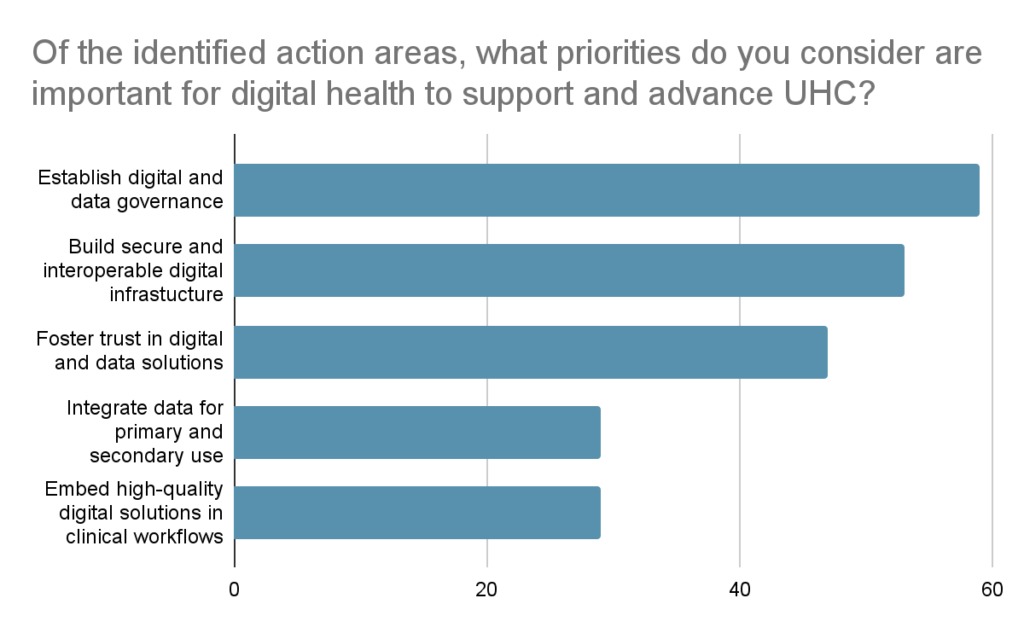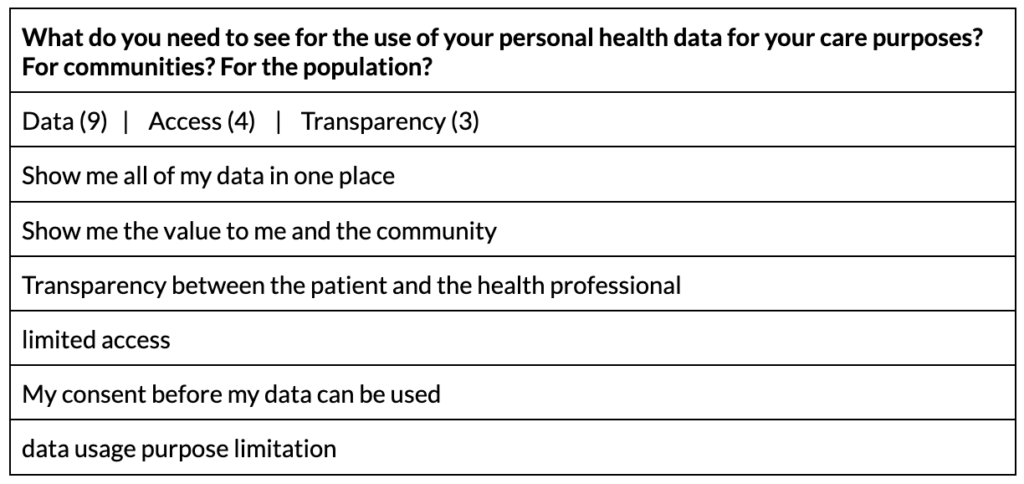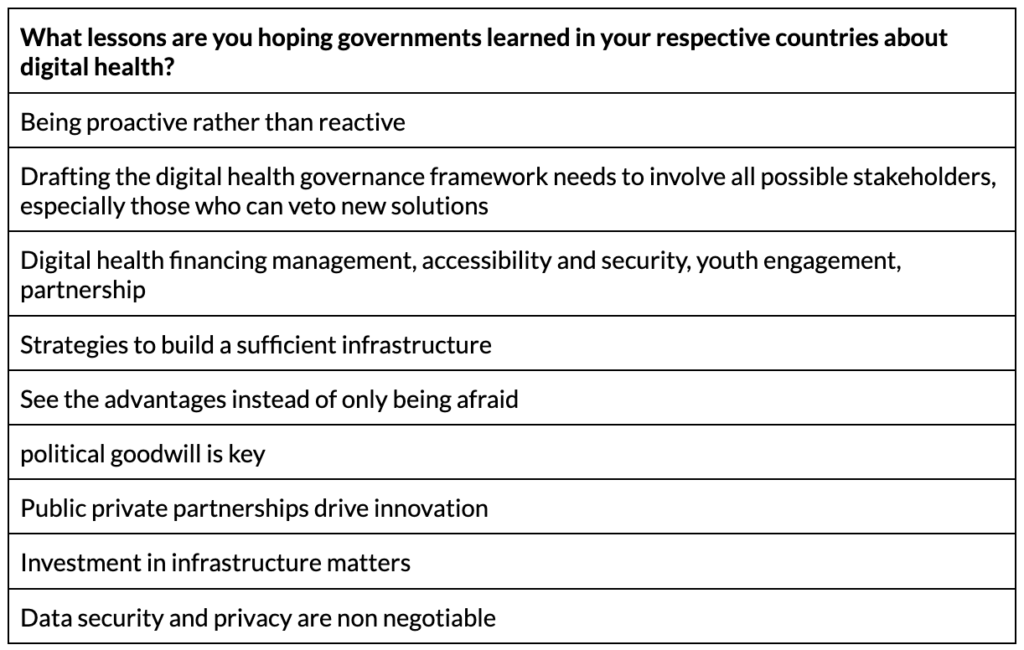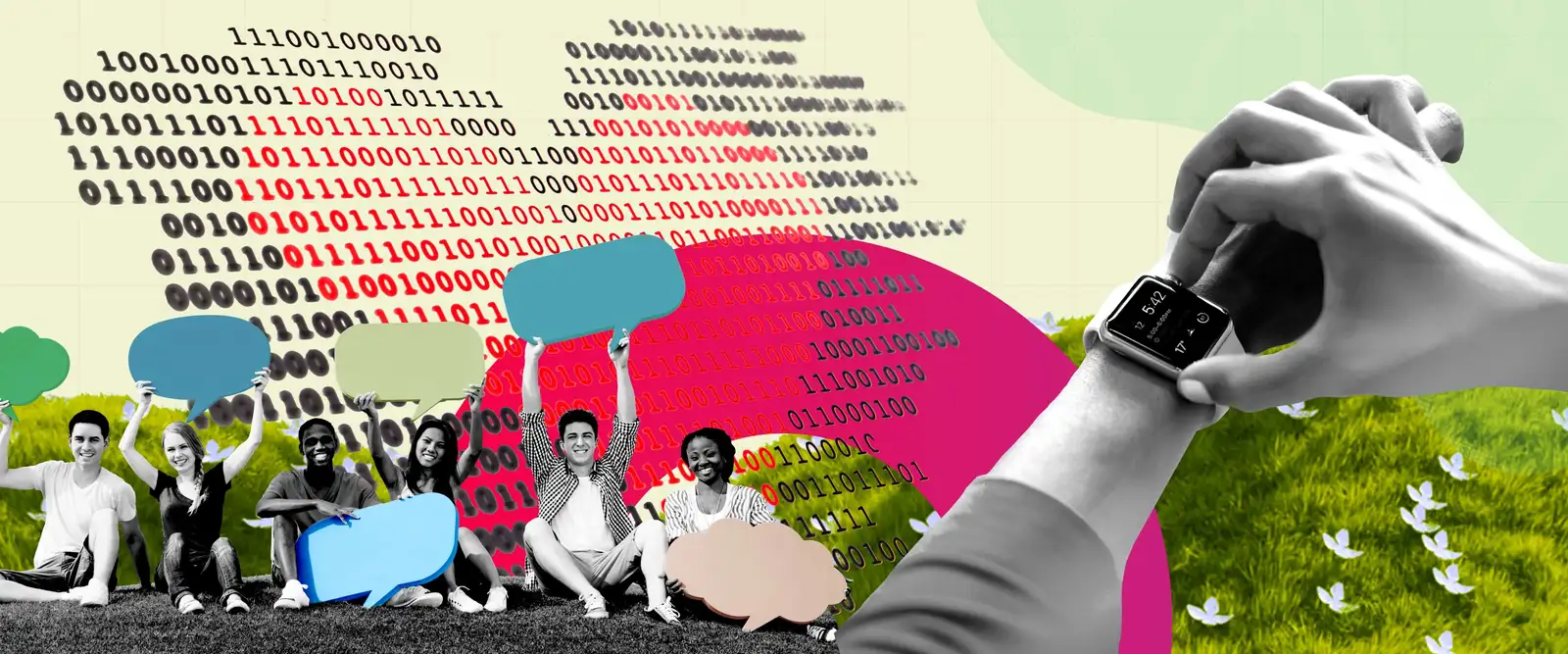Digital tools, ranging from clinical apps to comprehensive health information systems, have become central elements in the development and operation of modern health systems. The significance of these tools has been accentuated by the ongoing global pursuit of Universal Health Coverage (UHC )—a political commitment by the United Nations and the World Health Organization (WHO) to ensure that essential, high-quality health services are accessible to all individuals, regardless of socioeconomic status.
On Thursday 25 January, thirty youth champions from around the world were invited to participate in an interactive workshop on UHC and the integration of digital tools and health data. Organized by the Organisation for Economic Co-operation and Development (OECD) in collaboration with the Digital Transformations for Health Lab (DTH-Lab), the event aimed to explore the perceived transformative potential of digital technologies in achieving UHC by 2030.
This workshop is part of a series of three consultations OECD is hosting with different groups including Parliamentarians, youth and civil society organisations. During the event, young people identified three key areas that are crucial in advancing UHC within the digital transformation: (Figure 1)

Figure 1: Priority Areas of Digital Health to Support and Advance UHC by DTH-Lab Youth Participants
Youth explored the priority areas that are vital for improved investment if we are to achieve UHC while simultaneously fostering trust in the digital space. In understanding and addressing risks associated with digital health and UHC, participants explored and overcame barriers collectively. A more nuanced understanding of the challenges associated with digital health that transcend borders was discussed. By emphasizing the importance of trust, participants shared different practical applications of the importance of trusted systems and the need to feel secure in using digital tools and technology and sharing personal health data.


Table 1: Youth responses when asked the question, “what do you need to see for the use of your personal health data for your care purposes? for communities? for the population?”

Table 2: Youth responses when asked the question, “what lessons are you hoping governments learned in your respective countries about digital health”
Session highlights:
The insights gathered throughout this workshop and the ones that follow will be consolidated into a comprehensive paper to help shape real-world policies. This document will not only encapsulate the discussions but will serve as a powerful tool, influencing the WHO’s UHC2030 Secretariat in their 2024 planning activities. The collective efforts of the youth community are set to contribute substantially to the formulation of better policies, steering towards a more equitable future in global healthcare.
Imane Lakbachi is a youth and gender equality advocate from Morocco, she is the Director of Network Engagement at IYAFP, the Founder of Concealed Narratives, and a TransformNorms Fellow at the Apolitical Foundation.
Soe Yu Naing is a global health professional with more than ten years of experience in project management and scientific research.
Lydia Jummai Gara is a development professional with over four years of progressive experience in designing and implementing projects on Sexual Reproductive Health and Rights (SRHR), Universal Health Coverage, Meaningful Youth Participation and Gender Justice for adolescents and young people.


© 2025 DTH-Lab. All Rights Reserved.
Youth Empowerment | SRHR | Digital Advocacy | Human Rights | Sustainable Development
Imane Lakbachi is a human rights advocate with a background in computer science. She is the Director of Network Engagement at IYAFP, and the Founder of Concealed Narratives; a local youth-led initiative using digital advocacy and storytelling to raise awareness around women and girls issues in Morocco. Imane is also a Youth Reference Committee Member at the African Union, one of the Co-chairs of the Digital Experience Sub-Committee at PMNCH, a CEE Fellow at IREX, a Generation Democracy Member at IRI, a Women Deliver Young Leaders Program and Fora’s Global Summit Alumna and a Diana Award Winner 2022. Imane is incredibly passionate about sustainable development and is working with international NGOs, civil society organizations, and foundations on meaningful adolescent and youth engagement.
Digital ethics | Citizen Science | Digital health innovations
Soe Yu Naing is a global health professional with more than ten years of experience in project management and scientific research. He received an international MSc in Infectious Diseases and One Health (IDOH) from the Université de Tours (France), the Universitat Autònoma de Barcelona (Spain), and the University of Edinburgh (United Kingdom). He is a product of liberal arts education and has a bachelor’s degree in Neuroscience from Earlham College in the United States. Later, he joined the University of Pennsylvania to work on research toward HIV cure. Currently, he is a researcher at Utrecht University in the Netherlands. His work mainly focuses on molecular epidemiology of emerging infectious diseases and antimicrobial resistance. He is currently managing a transdisciplinary project titled “”Impact of reducing colistin use on colistin resistance in humans and poultry”” in Indonesia. Beyond academia, Soe Yu Naing collaborates with ISGLOBAL, OHT, and consults for WHO, contributing to global health policy. He also serves as a visiting faculty at Parami University in Myanmar, teaching research methods, infectious diseases, and One Health. In his leisure, he writes Burmese short stories and podcast scripts, tackling taboo subjects like sexual and reproductive health (SRH) to foster open discussions in Myanmar.
SRHR | Global Health | UHC | Gender Equality | Meaningful Youth Participation
Lydia Jummai Gara is a development professional with over four years of progressive experience in designing and implementing projects on Sexual Reproductive Health and Rights (SRHR), Universal Health Coverage, Meaningful Youth Participation and Gender Justice for adolescents and young people. As an Internationally certified program manager, Lydia has managed several internationally funded projects on the health and well-being of adolescents and young people across Africa. Driven by her passion for empowering fellow young individuals through the establishment of robust networks, Lydia is an active member of technical working committees at both local and international levels, tirelessly advocating for the voices of young people in matters of gender equality, promotion of SRHR information and services, inclusivity, and health equity.